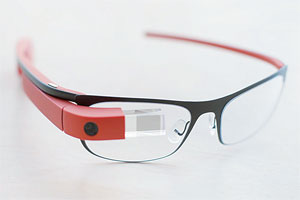- California Assembly OKs highest minimum wage in nation
- S. Korea unveils first graphic cigarette warnings
- US joins with South Korea, Japan in bid to deter North Korea
- LPGA golfer Chun In-gee finally back in action
- S. Korea won’t be top seed in final World Cup qualification round
- US men’s soccer misses 2nd straight Olympics
- US back on track in qualifying with 4-0 win over Guatemala
- High-intensity workout injuries spawn cottage industry
- CDC expands range of Zika mosquitoes into parts of Northeast
- Who knew? ‘The Walking Dead’ is helping families connect
Google Glass partners with Intel
Google Glass is getting set for some upgrades, announcing a move to Intel processors to replace its Texas Instruments CPUs that presently power the glasses. This is the first major improvement as Google sets the pathway to start 2015 with a head start on its competitors.
The official switch to Intel CPUs was reported on November 30th, by The Wall Street Journal as part of a master plan by Intel to further expand the world of wearable, smart technology.
An interesting aspect of this partnership is that Intel plans to promote Glass to companies such as hospital networks and manufacturers, while developing new enterprise uses for its devices. The holistic strategy seems to be a consumer-centric and business-oriented mindset that will allow Google Glass to be used by a broad range of individuals and entities across various spectrums.
The new eyewear will launch in 2015 and hopefully be universally accepted by the hospital and manufacturing industry. What does this mean for the healthcare industry and what can we expect?
First of all, the possibilities are endless. This means that doctors will be able to access medical records and documents as they meet new patients. Delays and costly mistakes will be drastically diminished, saving lives and time. Not only that, but medical professionals will be able to fact check certain patients and double-check important information that may be the difference between life and death. Also, correspondences between pharmacies and hospitals will be less stressful and more accurate, so that prescription drugs are dispersed in an organized and efficient manner.
The manufacturing industry is an interesting target for Intel and Google Glass. It seems like the obvious advantage for employees who are using the eyewear are for transportation and logistics purposes. The real-time data will be able to inform managers and warehouse employees of timetables, customer support inquiries, and even telephone calls. Universal meetings and emergency messages have the potential to be relayed back and forth at lightning speed, improving the central nature of manufacturing.
Of course, this is all guesswork and theory, but it is fun to speculate on how Google and Intel plan to strategize for the upcoming year. Regardless, 2015 will be a monumental year for technology and eyewear.
 |
Diane Kim Troy High School 9th Grade |

















kelly
November 27, 2017 at 2:06 PM
yes..I like the basic concepts behind Second Life but it seems incredibly outdated and when I played it was intensely non-intuitive / user friendly to an extent that made EVE look like a game for toddlers. thanks from
togel online